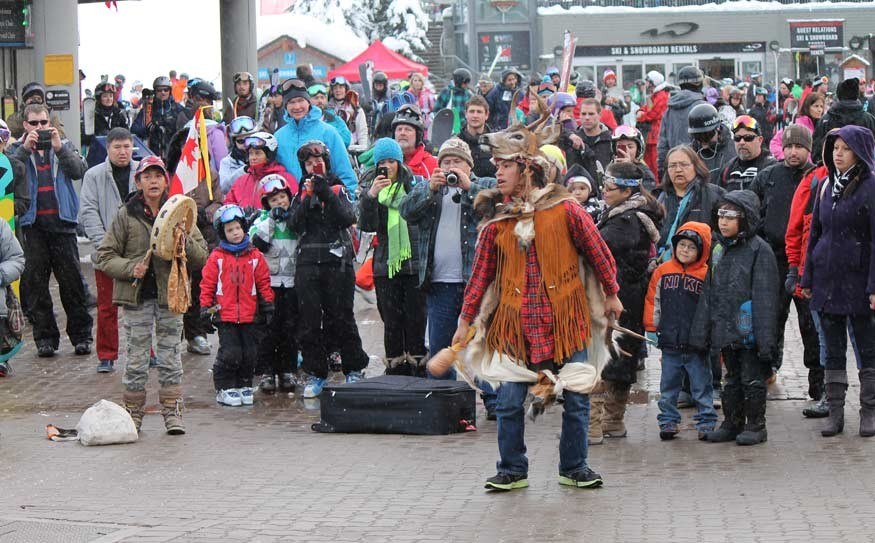Idle No More, the national First Nations protest against the federal government, hit Whistler in a big way with two major actions over the holidays.
In the first rally, around 100 people took part in a drumming circle at the base of Excalibur Gondola on Friday, Dec. 28, and in the second on Jan. 1, a further 33 took part in a "Kalhnilhmnin" or caretakers' march in support of hunger-striking Chief Theresa Spence of Attawapiskat First Nation in Ontario. The march wound through the village and ended with a sacred fire being lit in Whistler Olympic Plaza.
The first rally was called after organizers were moved by protests across Canada and by Spence's hunger strike.
"I think it was great to see all these people," co-organizer Theresa Joe said, adding this was the first protest she had ever taken part in, let alone arranged.
Joe said the aim of the Whistler rallies was to be peaceful, but to express many grievances, in particular poverty, current federal government dealings with indigenous communities across the country, and the "spoiling of our land through free trade agreements" like the recent FIPA agreement signed between Canada and China.
"I was thinking about the land, our land, about the people and the children and the future, how all these decisions affect us, how we have so little say. I just feel that it's unfair. We should be heard. And there is Chief Spence and her community, how it is for them and for many other communities, living with a lack of services and money towards education."
Idle No More grew following the recent passage of omnibus budget legislation, Bill C-45, by the federal government and the senate. Bill C-45 includes unilateral changes to the Indian Act and also removes federal protective laws from the majority of Canadian waterways, including lakes, rivers and streams.
A national day of protest took place on Dec. 21 in Ottawa, and Idle No More protests have included urban rallies, flash mobs and short blockades of rail lines and highways across Canada and in the U.S.
Spence has been on hunger strike since Dec. 11, and is requesting a meeting with Prime Minister Stephen Harper and Governor General David Johnston. Her community hit headlines a year ago after its MP, New Democrat Charlie Angus, brought up Attawapiskat's poverty in Parliament.
Spence has been living in a teepee on Victoria Island in the Ottawa River, less than a kilometre from Parliament Hill, since she started her fast. Her condition, as of Jan. 1, was described as "weakening."
"Chief Spence has courage. She is not only (on hunger strike) for her community, she is doing it for other communities across the land and bringing attention to the need for answers," Joe said.
Other First Nations communities also took part in the Whistler protest.
Court Blackbird Larabee, from the Lacs Des Mille Lac First Nation near Thunder Bay, Ontario, said "it's about time."
"I'm really happy that all the grassroots are getting together... We went to bed on Dec. 13 and woke up the next day with only nine protected rivers. That should concern every single one of us as Canadians," he said.
Both Chief Lucinda Phillips of the Lil'wat Nation and Chief Ian Campbell of the Squamish Nation addressed the Dec. 28 rally.
"It's exciting. Coming together like this in a peaceful demonstration to celebrate our tenacity that we're still here on the land and we're still upholding the integrity that our ancestors bestowed on us," said Campbell, afterwards.
"What's really important for Whistler's visitors is that they find a way to relate. We're all in the same canoe; certainly it's a global issue. The impact of (Bill C-45) on the water table and quality of air and our quality of life affects all of us.
"It's important to say that (the Squamish and Lil'wat) are more or less invisible in our own lands; the average person here doesn't know the breadth of our history and the connections to the land."
Because the drum circle rally took place in one of the busiest spots in Whistler, hundreds of skiers and snowboarders watched as around 50 drummers played and sang. Many of the foreign visitors, in particular, were not aware of Idle No More movement.
"You couldn't come to a better place to raise awareness of something like this," said Amanda Cohen from New York City. "I haven't heard of this issue and in a lot of ways it's up to Canadians to fix it themselves, but it's nice to see them carrying out their right to protest if they think they are being treated in a terrible way."
Said Inga Silberger of West Vancouver: "I feel very passionate about this in every way. I just hope that because it is across Canada, that it will have some sort of positive solution."
Representatives of Whistler Blackcomb observed Friday's rally and later released the following statement:
"Whistler Blackcomb was notified by local First Nations that a peaceful protest would be staged on our property at 2 p.m. This protest is not against Whistler Blackcomb; it is part of the 'Idle No More' movement and is against the Federal Government's Bill C-45.
"Whistler Blackcomb maintains a positive relationship with our local First Nations communities and we respect their right to protest."
Whistler RCMP were also in attendance, but kept a low profile. They were informed of the march through Whistler Village and the fire, and shared the information with Whistler Fire Rescue, organizers said.
More information can be found at idlenomore.com and on Twitter at #idlenomore.




